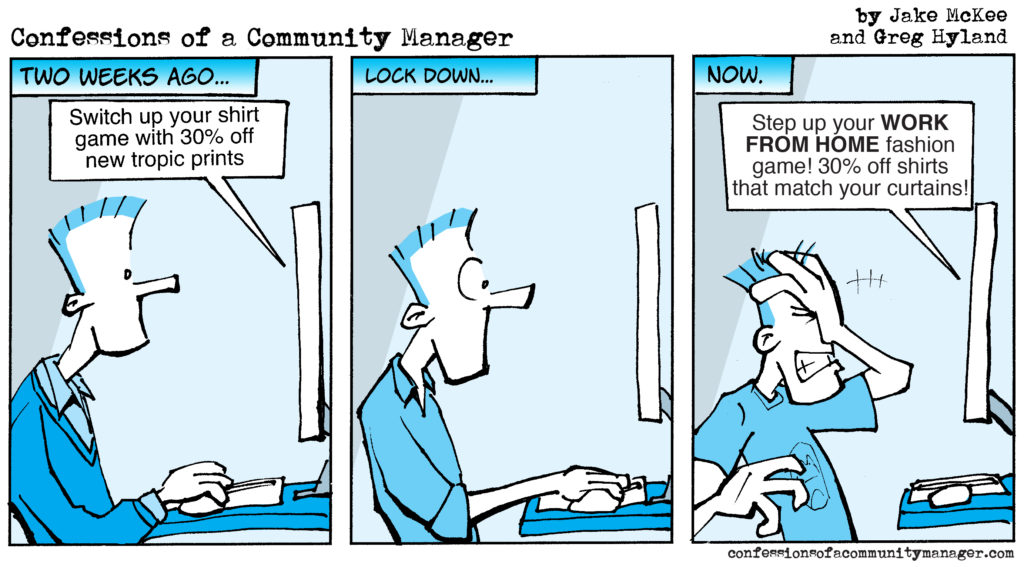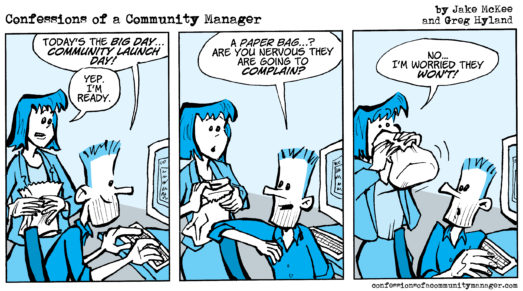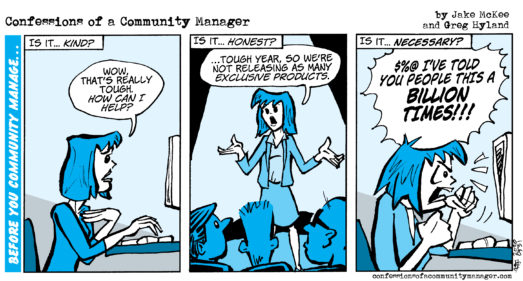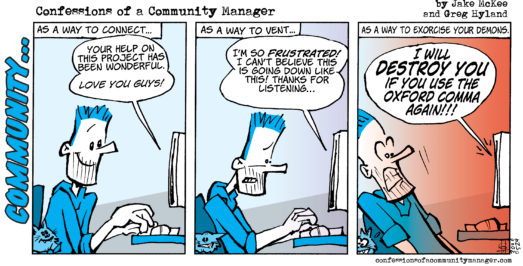Up your fashion game
Marketing is tough in normal times. But during a pandemic? Yikes.
Finding that balance between “I have to pay the bills” and “how can we not seem like sociopathic, uncaring monsters out to catch a buck no matter what’s going on in the world” is a tough one. One wrong move and that teetering balance tips easily.
During a conversation with Dinner5 alumni, Brian Oblinger he was dropping some really great insights. I turned our conversation into a formal interview to share here.
(At the time of posting, Brian is looking for a new role with a company that is looking to take their customer experience and community to the next level. Check out his LinkedIn for more information)
Jake: How would you say marketers have responded during the pandemic?
Brian: Marketers are in a tough position. It’s their job to promote their company’s products and services, but how do you square that with what is going on in the world today? How do you get the message out, generate demand, and keep your numbers above board without appearing tone deaf? In many ways, what society needs and what marketers need to stay afloat are at odds with each other.
I always think about the talk that Steve Jobs gave to Apple employees in 1997 in which he said that “marketing is about values.” To that end, the marketers that have had the best response during the pandemic are those that have stopped talking about their products and started talking about their values. The best way to be a signal in the noise is to explain what you stand for, what you’re going to do about it, and make people feel something about your brand. Empathy, compassion, inspiration, and hope are powerful feelings in a world overflowing with fear, uncertainty, and doubt.
Jake: What’s the right balance between respecting the customer and running the business during this crazy time?
Brian: I don’t believe there’s a choice here. Customers first, always. If a company sacrifices respect for their customers for any reason, then they don’t deserve to be in business. No matter the circumstance, customers deserve authenticity, transparency, and to be treated respectfully.
It turns out that in all of the data I’ve ever seen that a customer scorned tends to spend less or not be a customer anymore. It’s not rocket science.
Jake: Do you have any examples of marketing gone right during this time? Gone bad?
Brian: It’s tempting to make a list of winners and losers, but ultimately not my style. Instead, Here are the types of responses I’ve seen and some considerations. Readers can decide for themselves where they currently fit on the spectrum and where they should aim to go based on their company:
- The Business-As-Usuals
- What they’re doing: Exactly what they always do. There’s no discernible difference in what you see from them today as opposed to before the pandemic.
- Pros: For one, it’s easy. They’re not scrambling to blow up their plans and start over like many are doing right now. It’s easy to look at these folks and think negatively of their approach, but they may not have a choice due to resources. Or, depending on the industry they cater to, it may be the best plan.
- Cons: They run the risk of looking lazy, out-of-touch, tone deaf, facing public scrutiny, or opening the door for a more empathetic competitor to swoop in and steal customers.
- The Mutes
- What they’re doing: They’ve stopped all communications to customers indefinitely. Complete radio silence.
- Pros: They avoid making a mistake that opens them up to the cons for The Business-As-Usuals above. They may also feel it their duty to be silent as to not add to the noise. It can be seen as a respectful approach during a difficult time for people.
- Cons: This may come across as lazy, cowardly, or like they don’t care enough to engage in a meaningful way. It may also have competitive ramifications.
- The Opportunists
- What they’re doing: They see the opportunity and they’re going for it full-steam ahead. Leveraging COVID-19 is their entire strategy.
- Pros: It may provide a new level of relevance and be a boon for their business. It shows that they’re plugged into what is happening and are trying to be a part of the solution.
- Cons: If they’re not solving real problems for people, it will likely backfire. Authenticity is en vogue, and this is not that.
- The Over-the-Toppers
- What they’re doing: Sending way too many emails, tweets, and posts flooding all of your feeds all day, every day. Clinging onto their relevance for dear life.
- Pros: You will know for sure that your internet is still working as the communications endlessly stream in.
- Cons: They look desperate and are likely seeing mass unsubscribe/unfollow rates. Please stop.
- The Empathetic Connectors
- What they’re doing: They’ve stopped actively marketing and are trying to pass along information, connect with their audience, and offer comfort. They often display “we’re all in this together” and “we’re here to help however we can” mentalities.
- Pros: These are the brands that are thriving despite an incredibly difficult time. Their audience is appreciative and responsive to their attempts to be part of the culture. They’re building brand affinity and creating customers for life.
- Cons: They may take a financial hit in the short-term due to their insistence on not actively marketing/selling as they were before. You can put a price on doing the right thing, however, and they’ll likely make it through due to the brand equity they’re investing in.
I will share that as a sports fan and someone that grew up wanting to live out my dreams playing in front of sold-out crowds, this message from Nike cut to the core of me. It’s from a brand you already know and love, it’s timely, on-brand, heartfelt, and cool. They are the masters: https://twitter.com/Nike/status/1241364220555354113?s=20
Jake: How can community professionals help influence marketers to have a better connection to their customers in ways that matter during a crisis like we’re experiencing?
Brian: I can’t think of anyone more qualified to lead in creating meaningful connections with customers than community professionals. They can help marketers, and the rest of the company, with finding and living through those values we talked about earlier. There are large opportunities to leverage community, whether it already exists or they want to create something tailored and targeted for the times, to connect with customers, add value by solving their challenges, and build affinity for your products/services.
It’s definitely going to be a different than what marketers may be used to, but this is a great opportunity to forge new partnerships and test fresh approaches. Community folks can learn quite a bit from marketers as well. This type of symbiotic relationship will be critical for companies going forward to create an experience that attracts new customers and keeps existing ones loyal.
Today’s strip was inspired by an actual experience I had with a clothing company I use regularly. In normal times I was getting 2-5 marketing emails PER DAY from them. Yes, per day. Each one uninteresting pitches of discounts and hero images that meant nothing to me. Each one doing nothing to build a relationship with me that lasted beyond me needing a pair of a pants or a new shirt and thinking “oh nice, 40% off”.
I had unsubscribed, but a recent pre-pandemic visit to the store where I redeemed my loyalty (haha) points and I found myself (without permission) re-subscribed me to the email list.
To their credit, they paused the email blasts for about 2 days when things really started going sideways as stay-at-home orders were first kicking into gear. But the moment, the very moment they felt it wasn’t just ghastly, they were sending emails again. And in those first moments of the shift to working from home under stay-at-home orders, they were talking to me about getting my WFH fashion game on point. For who? Marcello the Business Cat? I seriously doubt he’d be judging me for not having the latest fashions while I was working at home.
And here’s the truly irritating part: they didn’t build any relationship with me before the pandemic, and they certainly aren’t even trying to do so during the pandemic. They weren’t showing me empathy, they weren’t trying to connect with me or support me. They were simply pushing their wares. I get that they have a job to do and a bottom line to manage. They’re like that friend who only pops up when they have a crisis that need to vent about but never asks how you are doing.
In the midst of a global pandemic that has us all on edge, be a partner and a friend not a cold corporate entity out to take my money. Be the light. We’ll remember those companies long after the pandemic, and we’ll want to do business with them long after the pandemic.



